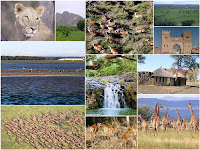Kenya leads the way in Solar, Wind and Geo-thermal Power
 |
| Kenya Renewable Energy |
Kenya is already a leader of renewable energy with three quarters of the country's energy coming from hydro-power and a further 11percent coming from geothermal sources. When the Lake Turkana Wind Power plant is completed, it will be the largest of its kind in Africa. Already, in Ngong Hills a short distance outside of Nairobi, is the country’s first wind power plant. It consists of six turbines and is capable of generating about 5 or so Megawatts of electricity. The plant is run by one of the main Kenyan Electricity Generating Company (KenGen).
In geo-thermal power, Kenya, through its government owned company - the Geothermal Development Company (GDC) is thinking and planning big: Kenya has unveiled a plan to construct the largest geothermal power plant in Africa, capable of generating 2,000 Megawatts; the Bogoria-Silali geothermal project has an estimated potential of providing up-to 3,000 Megawatts of electricity. Kenya, in line with its Vision 2030 plan, is aimimg to produce about 5,000 Megawatts of geothermal electricity in 2030. In Africa, Kenya has been the firsts to build geothermal plants; the plants, so far, are all in the Rift Valley Province.
It is very relieving and comforting knowing that Kenya, and East Africa in general, are turning to clean renewable energy; with fossil fuels expensive, being depleted fast and being as environmentally unfriendly as they are; with nuclear energy very expensive to start and as dangerous as it is; the best and most sustainable way for Kenya and Africa, is to invest in renewable resources as much as they can. Using renewable energy, means: we can use it repeatedly without depleting it; we do not pollute the environment and contribute to Climate Change; and, when counting all costs, in the long run - we save on health and its costs. The more we use renewable energy, the more we benefit the environment and keep it clean; the more we strengthen our energy security. At the same time: we create jobs locally, and help improve our economy.
* Read more from here.


